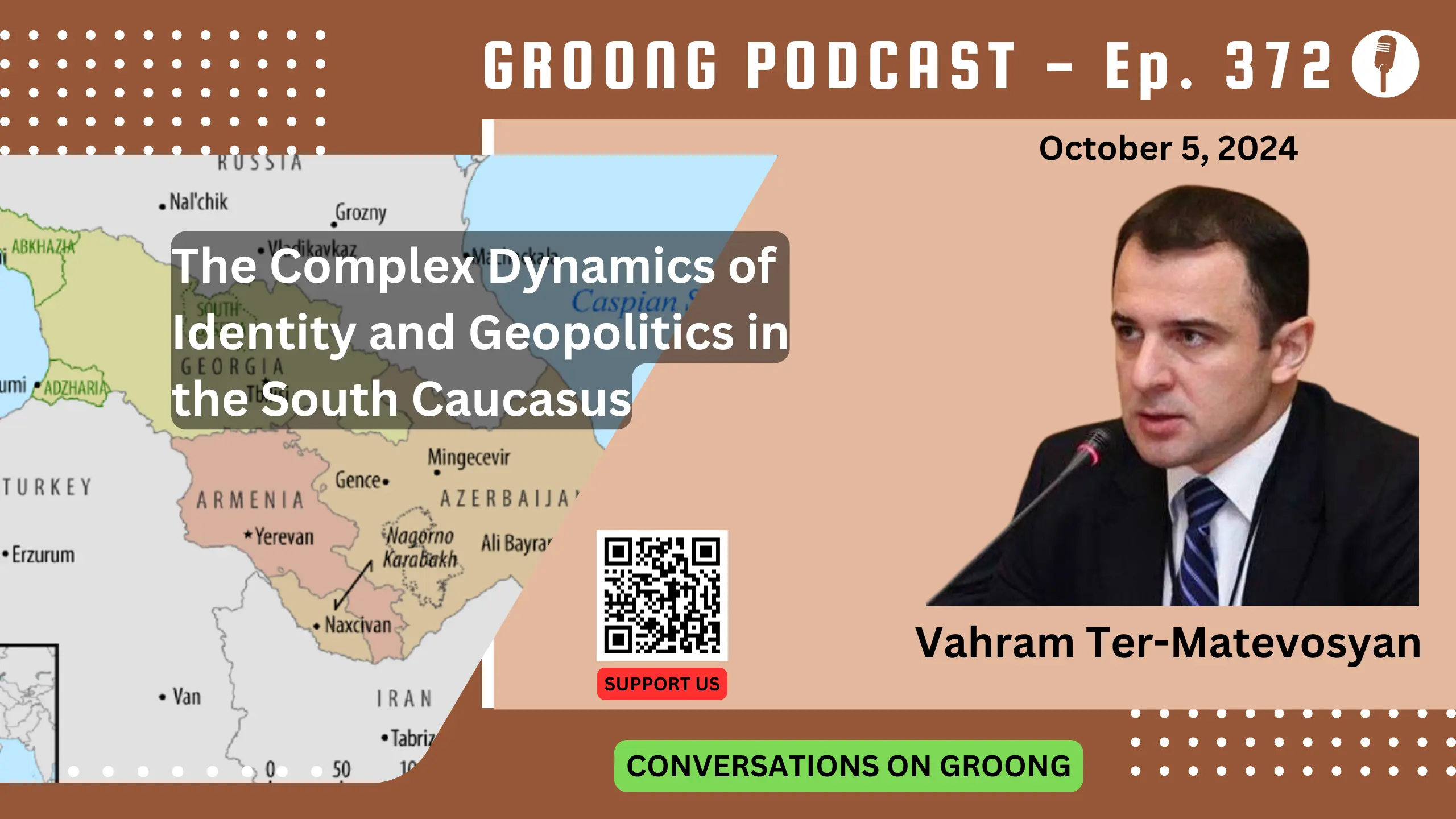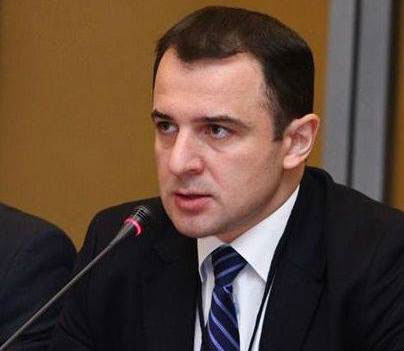
Groong Links:
Guest:
Topics:
- Armenian Identity and Integration in the South Caucasus
- On the Nature and Thinking of the Armenian Constitution
- Relations with Russia Through Time
- The Geopolitics Around the South Caucasus
Episode 372 | Recorded: October 2, 2024
Show Notes
The Dynamics of Identity and Geopolitics in the South Caucasus
In your recent paper, From Transcaucasia to the South Caucasus: Structural and Discursive Predicaments in Armenia’s Regional Integration (June 2023), you document the perception of Armenia within the wider geopolitical region over time. Over the past 200 years, the constant is that Armenia has largely perceived its destiny to be linked with Russia. Yet, with the outcome of the 2020 war in Artsakh and other larger geopolitical shifts, this perception is currently in the process of being challenged.
Questions:
- What are the key takeaways from your paper in your own words? What is the goal of the historical analysis? How can it or should it inform policy?
- How does Armenian identity today relate to the historical longue durée view?
You caution that your type of analysis (long duration/term or long time frame) might miss points of inflection in a short period of time. Because, if we look at it in a time frame of 200 years, it is clear that Russia is our natural ally.
Question:
- Is the message that we should be mindful of historic trends rather than being near-sighted about current events?
After 2020 and the complete ethnic cleansing of Karabakh’s Armenian population just a year ago, Armenian identity has become an object of contention with Turks and Azerbaijanis, leading to various demands, including that Armenia change its constitution to remove any reference to the declaration of independence, which in its turn refers to several points of controversy:
- The 1988 vote on the unification of Karabakh and Armenia.
- References to western Armenia and the Armenian Genocide
- Role of Armenia in supporting the Armenian diaspora worldwide
These three issues are seen by Turkey and Azerbaijan as a threat. And recently, Nikol Pashinyan has lent credence to those points by arguing that Armenian patriotism is “destructive”. In his worldview, the definition of Armenia is pretty strict, encompassing 28K sq km. Worrying about anything outside of these boundaries or even apparently supporting Genocide recognition, has nothing much to do with the state of Armenia and in fact is a source of danger.
Meanwhile, on Sep 19, the anniversary of Artsakh’s ethnic cleansing, Ihlam Aliyev was in Stepanakert, where he toured the depopulated town, opened a university and called Armenians effectively settlers and visitors, visitors in a region where they’ve lived for thousands of years.
Questions:
- What are your thoughts on Pashinyan’s recent statement that Armenian patriotism is destructive?
- Is this a sincere, perhaps pragmatic, attempt to save Armenia from decline, or is this part of a broader geopolitical strategy influenced by Turkish actors at a time of great Armenian weakness?
- Is there a legitimate case for changing Armenia’s constitution in light of ongoing external pressures?
- Discuss the implications of modifying references to the Armenian Genocide, Western Armenia, and the diaspora.
- Can Armenian identity be changed in such a top down manner?
The 3+3 Format: A New Regional Order?
In your paper, you describe the South Caucasus historically as a region that is being pulled from multiple directions, with the exception of a brief period in the 1920s. After the 2020 war and then the Russia-West conflict that erupted in Ukraine, a new 3+3 regional format was proposed for dealing with issues of the region.
- Who are the proponents of the 3+3 and is it possible for the South Caucasus to form a distinct political region by itself?
- Since 2004, Georgia has been inching toward the EU, but we’ve been hearing statements from the Georgian Dream government and Russian officials and analysts that hint at a potential rapprochement between Georgia and Russia. How likely is this scenario and could this lead to a confederation involving Georgia, Abkhazia, and South Ossetia?
- How much does the Russian conflict with the West influence the self-perception and political maneuvering of the nations in the South Caucasus?
References
Two recently published papers we reference in our discussion:
- From Transcaucasia to the South Caucasus: Structural and Discursive Predicaments in Armenia’s Regional Integration (June 2023)
- Armenian interpretations of Kemalism: rethinking diaspora and soviet intellectual debates in the 1920s (July 2023)
Wrap-up
That’s our show! We hope you found it useful. Please find us on Social Media and follow us everywhere you get your Armenian news.
Thanks to Laura Osborn for the music on our podcasts.
Guests

Vahram Ter-Matevosyan
__ Dr. Vahram Ter-Matevosyan__ is a Professor at the College of Humanities and Social Sciences of the American University of Armenia. His expertise lies in the political history of Turkey, Kemalism, political Islam, and the foreign and security policies of the South Caucasus nations. He earned his Doctorate from the University of Bergen in Norway. He has authored two monographs and more than a dozen book chapters and research articles which have been published in edited volumes by Routledge and Springer, as well as in peer-reviewed journals such as Nations and Nationalism, Third World Quarterly, Europe-Asia Studies, Turkish Studies, Middle Eastern Studies, and Digest of Middle East Studies
Hosts

Hovik Manucharyan
Hovik Manucharyan is an information security engineer who moved from Seattle to Armenia in 2022. He co-founded the ANN/Groong podcast in 2020 and has been a contributor to Groong News since the late 1990s.
Disclaimer: The views expressed by Hovik Manucharyan on the ANN/Groong podcast are his own and do not necessarily reflect the opinions of his employer or any other organization.

Asbed Bedrossian
Asbed Bedrossian is an IT professional, and for years oversaw the central IT enterprise infrastructure and services at USC. His decades of experience spanned across IT strategy, enterprise architecture, infrastructure, cybersecurity, enterprise applications, data center operations, high performance computing, ITSM, ITPM, and more.
Asbed founded the Armenian News Network Groong circa 1989/1990, and co-founded the ANN/Groong podcast in 2020.